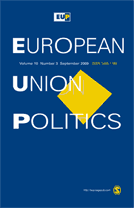European Union Politics
European Union Politics (EUP) is a peer-reviewed academic journal for research and scholarship on the processes of government, politics and policy in the European Union. The journal was established in 2000. Its founding editor, Gerald Schneider (University of Konstanz, Germany), continues to serve as the Executive Editor. EUP is published on a quarterly basis in March, June, September and December by Sage Publications.
 | |
| Discipline | Political science |
|---|---|
| Language | English |
| Edited by | Gerald Schneider |
| Publication details | |
| History | 2000-present |
| Publisher | SAGE Publications |
| Frequency | Quarterly |
| 1.754 (2015) | |
| Standard abbreviations | |
| ISO 4 | Eur. Union Politics |
| Indexing | |
| ISSN | 1465-1165 (print) 1741-2757 (web) |
| LCCN | 00234202 |
| OCLC no. | 43598989 |
| Links | |
Abstracting and indexing
European Union Politics is abstracted and indexed in Current Abstracts, Current Contents, International Bibliography of the Social Sciences, and the Social Sciences Citation Index. According to the Journal Citation Reports, the journal has a 2018 impact factor of 2.600, ranking it 30th out of 176 journals in the category "Political Science".[1]
Scope
EUP's aim is to stimulate debate and provide a forum to bridge theoretical and empirical analysis on the political unification of Europe. While the journal represents no particular school or approach, it has served as an outlet for applications of rational choice theory. It also frequently contains articles on decision making in European institutions such as the Council of Ministers or the European Parliament and analyses of public attitudes towards the EU. The journal has published special issues on such topics as euro-skepticism, constitution-building, and the impact of the EU on ideological competition.
Data replication
EUP requires all authors to make their data publicly available once their article is accepted for publication. The data replication policy of the journal - in common with that of many journals in the sciences - aims to render the research process more transparent and cumulative.
See also
References
- "Journals Ranked by Impact: Political Science". 2018 Journal Citation Reports. Web of Science (Social Sciences ed.). Thomson Reuters. 2018.